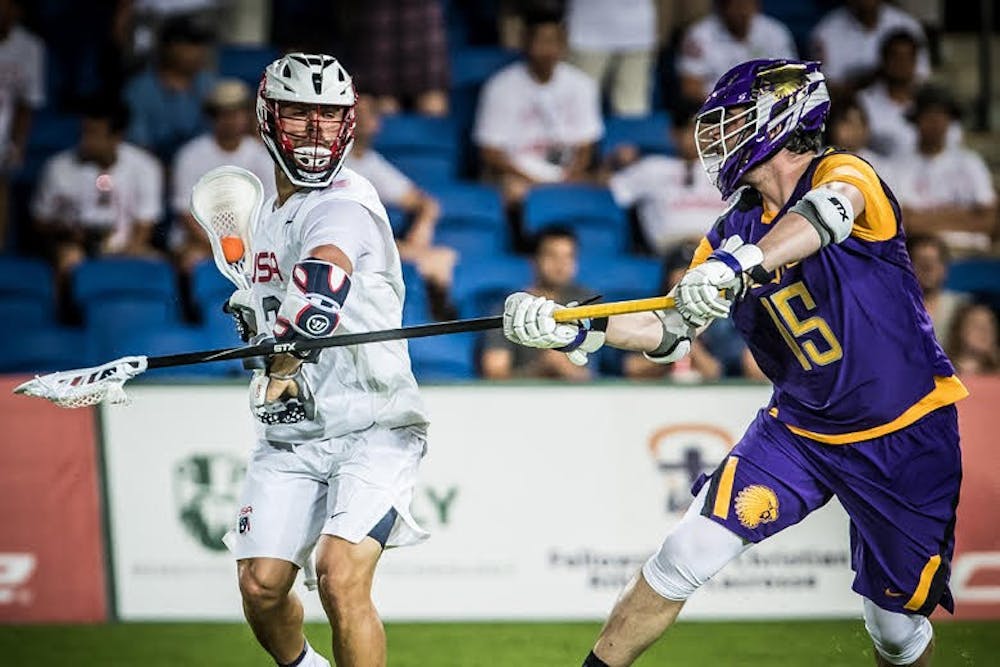According to Native Americans, the Creator long ago passed down lacrosse to Native Americans. More than a sport, it was a medicine and allowed for healing of the people. Today, lacrosse is the fastest sport on two feet, played all around the world. As a Native American student athlete of the Métis tribe, I have continued to share the game to people of all ages and races. I, along with other Native Americans, want all to enjoy watching and even playing the game handed down to us. Yet many people around the world play without including us.
I am a member of a national indigenous men’s lacrosse team, the Iroquois Nationals, primarily composed of players of Haudenosaunee descent. We take pride in representing the Creator and battling on the lacrosse field with the best the world has to offer. But we have found we are in a community that fails to properly recognize our sovereignty.
Recognition has always been a problem for Native Americans when it comes to politics, but we did not think it was a problem in lacrosse. The lacrosse world knows who we are and what our teams and people mean to the game. It wasn’t until 2010 that inadequate recognition drew my attention, when the Iroquois Nationals faced difficulty even reaching the turf to play. The same scenario happened again in the summer of 2018. Lacrosse should have been a venue to assert the sovereignty of the Iroquois Confederacy, which spans the U.S. and Canada, but instead it became the site of our sovereignty’s denial.
As a sovereign nation, we take pride in traveling using our own Haudenosaunee passports. As Oren Lyons, cocreator of the Iroquois Nationals, put it, “Sovereignty is freedom of a people to act and conduct affairs of its own nations. We the Haudenosaunee, the People of the Longhouse, the Six Nations, have our sovereignty. We conduct on our territories, and we act for our people... The white man says, ‘this is mine,’ Indian says, ‘This is ours.’ That’s the two ideologies, this is the conflict.”
In 2010 and 2018, this conflict erupted. In 2010, the World Lacrosse Championship took place in Manchester, England. In 2018, the World Championship took place in Netanya, Israel. Both countries failed to recognize the Haudenosaunee passports of the Iroquois Nationals.
This exclusion led our team to withdraw from the 2010 tournament. The assistance of the Canadian and American governments came too late. In 2018, the same issue occurred, resulting in a three-day travel delay. Both Canadian Prime Minister Justin Trudeau and U.S. President Donald Trump intervened. Cooperation between these leaders and Israeli President Benjamin Netanyahu led Israel to accept the team’s passports. After an extensive six-hour boarding process and a 14-hour flight, we finally made it to the tournament. We are proud to have won bronze.
Today we face another battle of recognition, now with the International Olympic Committee (IOC). On Nov. 30, 2018, the IOC Executive Board voted to provisionally recognize the Federation of International Lacrosse (FIL). Lacrosse will be added to the 2028 Olympics as a trial sport. This will be the first appearance of lacrosse at the Olympics since 1932. Yet the Iroquois Nationals, recognized by the FIL as a sovereign nation, are not gaining recognition from the IOC. Currently we are battling against a specific issue of the Olympic Charter.
The IOC’s bylaws claim that a country is “an independent State recognized by the international community.” They further stipulate that the name of a “National Olympic Committee” is specific to the “territorial extent and tradition of its country,” subject to approval by the executive board of the IOC.
Yet there have been recent exceptions. Refugees have competed under the Olympic flag, and the commonwealth of Puerto Rico has competed separately from the U.S. team. Still, the IOC has yet to give recognition to the Haudenosaunee people. This stance appears hypocritical because the IOC states that its purpose is “to create a way of life based on the joy of effort, the educational value of a good example, social responsibility, and respect for universal fundamental ethical principles.”
Could it be that there is room at the Olympics for lacrosse, our ancestral sport — which is attuned to the creation of a way of life based on the joy of effort — but not for the political sovereignty of the people who have shared this way of life with the world?
Recognition has consistently been a problem for Haudenosaunee people and other Native Americans, including myself. The IOC is barring our inclusion to the international sporting community. But I believe that the IOC will do the right thing and accept the Iroquois Nationals in the 2028 Olympics in Los Angeles.
I, a Métis lacrosse player, was barely allowed to travel halfway across the world to represent my people at the highest playing level of our game. But it will be an advance for indigenous sovereignty if I will be allowed to play lacrosse under my own nation’s flag in Los Angeles.
Jake Fox is a senior Political Science major from Ottawa, Ontario, Canada. A member of the Métis Tribe, he has played as a member of the Iroquois Nationals lacrosse team as well as with Hopkins Men’s Lacrosse.





